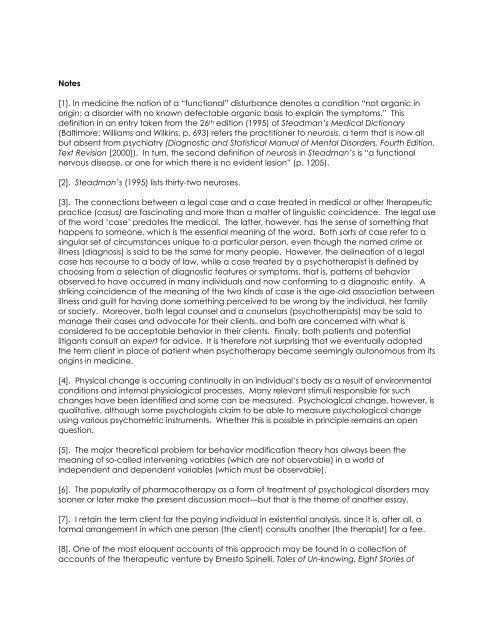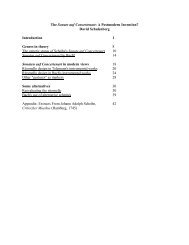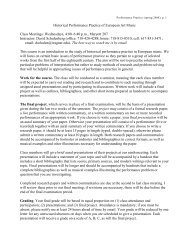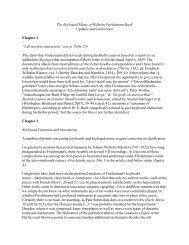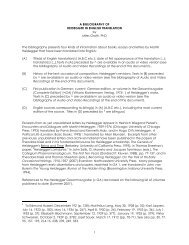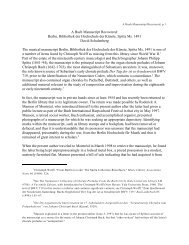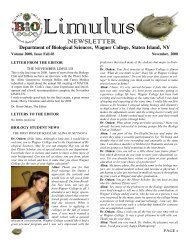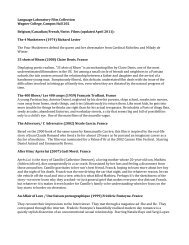SEVEN PAPERS ON EXISTENTIAL ANALYSIS ... - Wagner College
SEVEN PAPERS ON EXISTENTIAL ANALYSIS ... - Wagner College
SEVEN PAPERS ON EXISTENTIAL ANALYSIS ... - Wagner College
Create successful ePaper yourself
Turn your PDF publications into a flip-book with our unique Google optimized e-Paper software.
Notes<br />
[1]. In medicine the notion of a “functional” disturbance denotes a condition “not organic in<br />
origin; a disorder with no known detectable organic basis to explain the symptoms.” This<br />
definition in an entry taken from the 26 th edition (1995) of Steadman’s Medical Dictionary<br />
(Baltimore: Williams and Wilkins, p. 693) refers the practitioner to neurosis, a term that is now all<br />
but absent from psychiatry (Diagnostic and Statistical Manual of Mental Disorders, Fourth Edition,<br />
Text Revision [2000]). In turn, the second definition of neurosis in Steadman’s is “a functional<br />
nervous disease, or one for which there is no evident lesion” (p. 1205).<br />
[2]. Steadman’s (1995) lists thirty-two neuroses.<br />
[3]. The connections between a legal case and a case treated in medical or other therapeutic<br />
practice (casus) are fascinating and more than a matter of linguistic coincidence. The legal use<br />
of the word ‘case’ predates the medical. The latter, however, has the sense of something that<br />
happens to someone, which is the essential meaning of the word. Both sorts of case refer to a<br />
singular set of circumstances unique to a particular person, even though the named crime or<br />
illness (diagnosis) is said to be the same for many people. However, the delineation of a legal<br />
case has recourse to a body of law, while a case treated by a psychotherapist is defined by<br />
choosing from a selection of diagnostic features or symptoms, that is, patterns of behavior<br />
observed to have occurred in many individuals and now conforming to a diagnostic entity. A<br />
striking coincidence of the meaning of the two kinds of case is the age-old association between<br />
illness and guilt for having done something perceived to be wrong by the individual, her family<br />
or society. Moreover, both legal counsel and a counselors (psychotherapists) may be said to<br />
manage their cases and advocate for their clients, and both are concerned with what is<br />
considered to be acceptable behavior in their clients. Finally, both patients and potential<br />
litigants consult an expert for advice. It is therefore not surprising that we eventually adopted<br />
the term client in place of patient when psychotherapy became seemingly autonomous from its<br />
origins in medicine.<br />
[4]. Physical change is occurring continually in an individual’s body as a result of environmental<br />
conditions and internal physiological processes. Many relevant stimuli responsible for such<br />
changes have been identified and some can be measured. Psychological change, however, is<br />
qualitative, although some psychologists claim to be able to measure psychological change<br />
using various psychometric instruments. Whether this is possible in principle remains an open<br />
question.<br />
[5]. The major theoretical problem for behavior modification theory has always been the<br />
meaning of so-called intervening variables (which are not observable) in a world of<br />
independent and dependent variables (which must be observable).<br />
[6]. The popularity of pharmacotherapy as a form of treatment of psychological disorders may<br />
sooner or later make the present discussion moot—but that is the theme of another essay.<br />
[7]. I retain the term client for the paying individual in existential analysis, since it is, after all, a<br />
formal arrangement in which one person (the client) consults another (the therapist) for a fee.<br />
[8]. One of the most eloquent accounts of this approach may be found in a collection of<br />
accounts of the therapeutic venture by Ernesto Spinelli, Tales of Un-knowing. Eight Stories of


